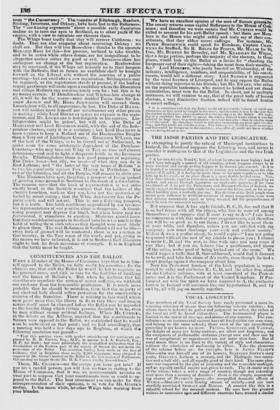CONSTITUENCIES AND THE BALLOT.
WHEN a Member of the House of Commons says that he is him- self opposed to the Ballot, we folly credit his assertion ; for the chances are, that with the Ballot he wculd bs left to vegetate on his paternal acres, and sigh in vain for the facilities of franking and the fumes of Bellamy's. But when he declares that his ronslitacnts repudiate the notion of secret suffrage, we withhold our credence from the honourable gentleman. It is much more probable that he should be mistaken, than that the mejority of any electoral body should refuse protection for the conscientious exercise of the franchise. There is nothing in this world which men pr:ze more than the liberty to do as they like ; and human nature itself must be changed before the Ballot can be regarded as the hateful thing which certain persons. describe it to be, even by men without strong political feelings. When Mr. CURThji, in the debate on the Address, asserted that his constituents in Sussex were opposed to the Ballot, we anticipated that he would aeon be undeceived on that point ; and we find accordingly, that a meeting was held a few days ago in Brighton, at which tle following resolution was passed- " That this meeting views with perfect aeonisbment the sentiments ex- pressed by H. B. Curteis, Esq., in answer to J. A. Roebuck, Esq., M. P. for Bath ; but more particularly the unqualified declaration that the Freeholders of the Easton part of the county of Sussex did not desire the protection of the Ballot. This assertion having been made in the fare of evidence, that in Brighton alone nearly 2,504 signatures were obtained in support of 3Ir. Grote's motion on the Ballot in the last session of Parliament, this meeting no longer deems Mr. II. B. Cm Iris worthy its confidence."
There, Mr. CURTEIS—see the scrape you have got into! If you are a candid person; you will lose no tibiae in stating to the House of Commons, that it was an unaccountable mistake on your part to suppose that your constituents were or could be op- posed to the Ballot. The best atonement you can make for this misrepresentation of their opinions, is to vote for Mr. GROTE'S motion. In the mean while, let other Whigs take warning from your blunder. We have an excellent opinion-of the men of Sussex .generally; The county returns some capital Reformer's to the House of Cori. mans; and therefore we were certain that Mr. Conyers would be called to account for his anti-Ballot speech : but there are Mem- bers in the House who might safely and truly say of their,con- stituents, that they abhor secret suffrage. For instance, Mr. PETER BORTHWICK could speak for Evesham, Captain CHET- WEND for Stafford, Sir R. Reuse for Penryn, MT. HALSE for St. Ives, Mr. BURTON for Beverley, and Mr. KEARSLET for Wigan, that a large portion, perhaps the majority of the electors, in those places, would look on the Ballot as a device for " cheating the burgesses out of their rights—taking the meat from their mouths," &c.* Lord MORPITH, who justly boasted on Wednesday, of the industry, intelligence, numbers, and respectability, of his consti- tuents, would tell a different story. Lord BANDON is supported by the venal freemen of Liverpool, and he may oppose the Ballot without doing injustice to his friends; but Mr. EWART, who relies on the reputable tradesmen, who cannot be bribed and yet dread intimidation, must vote for the Ballot. In short, not to multiply instances, we will venture to say, that of' the great body of honest electors, a very diminutive fraction indeed will be found hostile to secret suffrage.
• It is sometimes said that the Ballot would not prevent the bribery of small con- stituencies, as they could be bought in the mass ; and therefore it may be thoaght that
the electors in the place:: ahove•meutioned would nut objet to the Ballot. We reply, that if a candidate has 5,0001. to spare. the worthy electors would rather it was di,. tributed in large sour.; to a small number—to a Imre majority—than in 6 mailer sum. to ott the venal. Besides,tbere would lie dillieuhy in exacting payment after the elcc• thou ; and this would not snit the voters. The bribery, too, would be more noterious; and that would be dangerous to the candidate, who, after all, would not know whether he was fechig friend Or Ice.


























 Previous page
Previous page